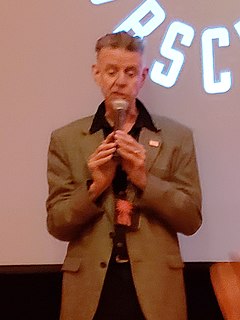A Quote by Shane Smith
If you look at film, distribution is pre-bought. If you've paid for the distribution, you say, 'I have to make sure it's a film that gets enough butts in the seats.' I think that's the problem: It becomes prohibitively expensive, and you can't develop films for a smaller amount of money.
Related Quotes
When I started, every film got a full theatrical distribution. Today, almost no low budget films, maybe two or three a year, will get a full theatrical distribution. We've been frozen out of that, which means they must be aware that for a full theatrical distribution it either has to be something like Saw or some exploitation film of today or an extremely well made personal film.
I didn't have anything to do with selecting IFC. I don't have anything to do with distribution, or business, or marketing, but think it's a good choice by Graham, and perfect for London Boulevard. It gets the picture straight into a dialog with the public, and it doesn't set the sights too high. They're very hip at IFC, and they get the film. The cineplex hasn't done film any favors as an art form.
When I said that something was going to cost a certain amount of money, I actually knew what I was talking about. The biggest problem that we were having on the financing front was people with lots of money saying "you need more money to make this film [Moon]," and us saying "no this is the first feature film we want to do it at a budget where we sort of prove ourselves at the starting end of making feature films; we can do this for $5 million." That is where the convincing part between me and Stuart came, we had to convince people with money that we could do it for that budget.
The top stars like Angelina, Cameron (Diaz), Sandra Bullock and probably now Jennifer Lawrence probably gets paid the same as their male counterparts. The problem is the averages. Because there are not enough parts for women to star in and get paid. So when you look at the total amount women make as compared to men it's paltry.
The biggest problem in countries that don't have a tradition in animation or a film industry, is that precisely, that it's not an industrial activity as it is in Hollywood where there are clear production procedures. Because of this we all become snipers making our films any way we can and crossing our fingers to get distribution so people can see them.

































